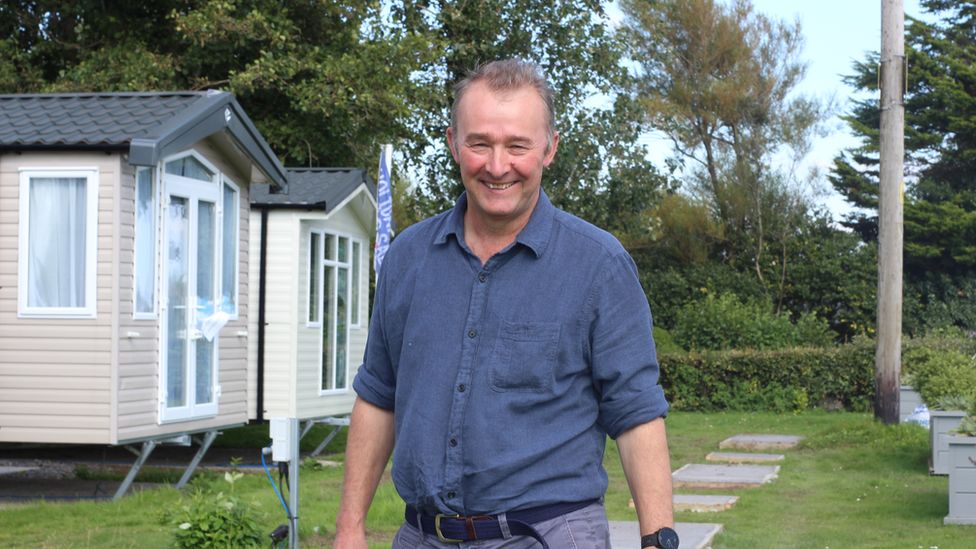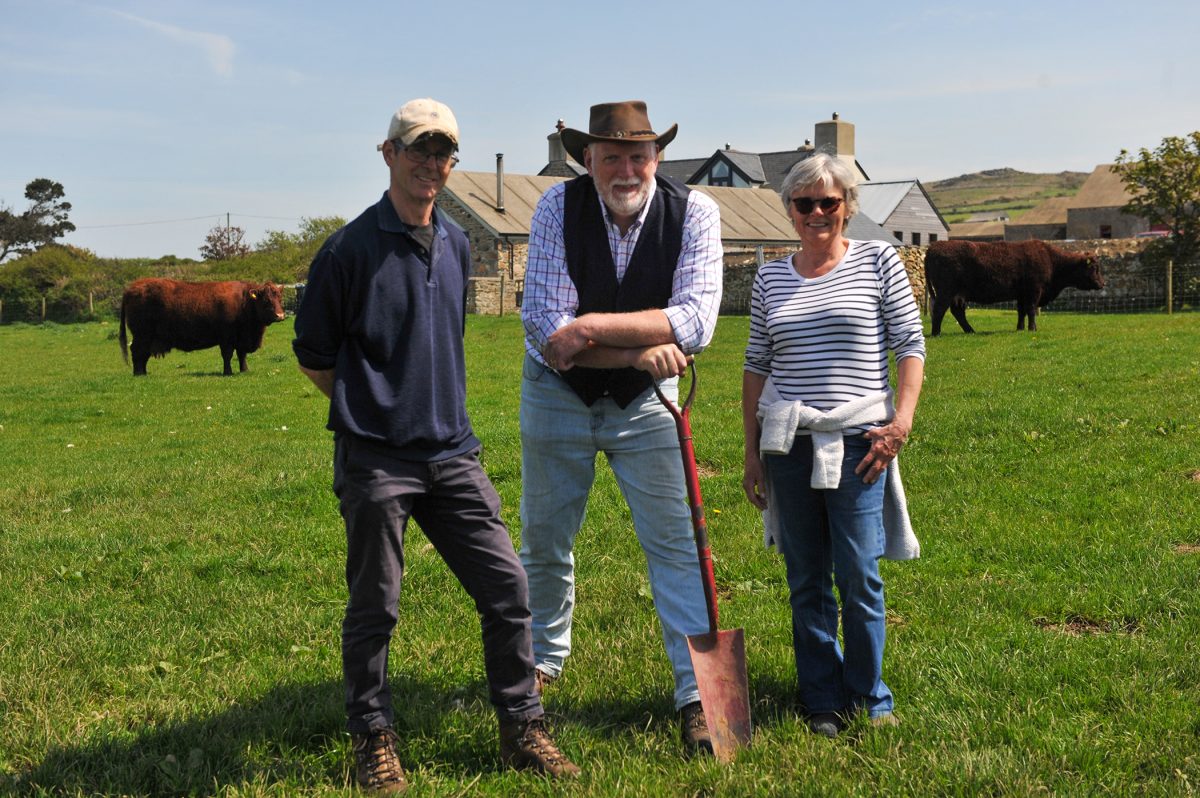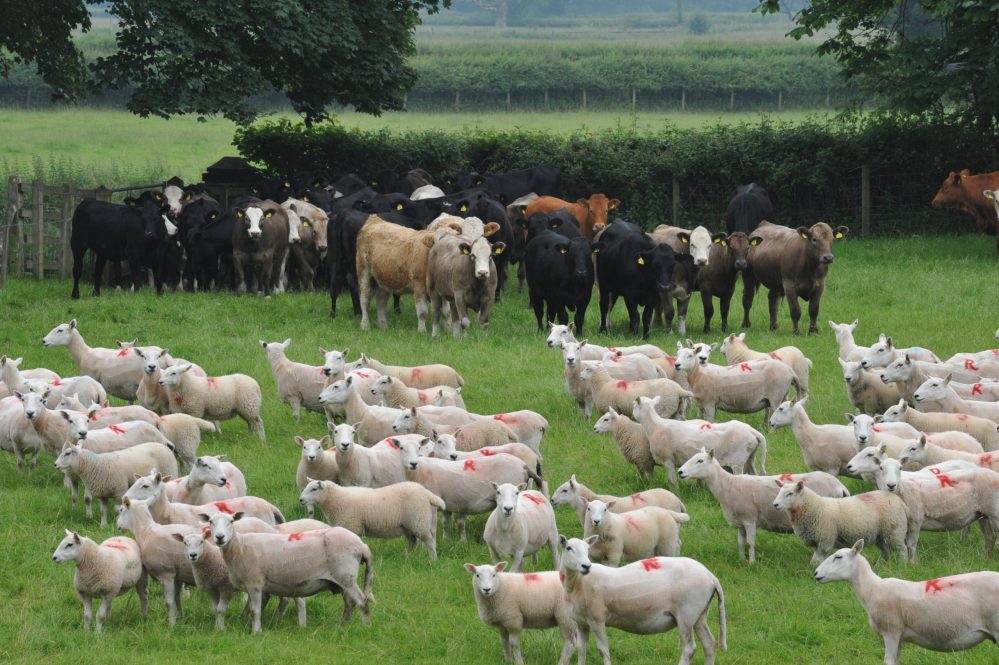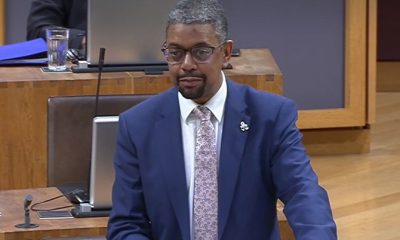Farming
Simon Hart calls for a Sustainable Farming Scheme that delivers

FURTHER delays to the introduction of new farming subsidies in Wales have met with a cautious welcome.
Following widespread protests from farmers, Welsh Labour Rural Affairs Secretary, Huw Irranca-Davies, has announced the Sustainable Farming Scheme will now be put on hold until 2026.
The decision has been welcomed by former Secretary of State for Wales Simon Hart MP. The candidate for Caerfyrddin says the Welsh government must now work closely with farmers – and not against them.
He said: “We are told this decision shows the Plaid Cymru / Welsh Labour Cooperation administration is listening to farmers concerns. In my opinion, they should have been listening to them from the get-go and these proposals should never have been included by Plaid Cymru as part of their co-operation agreement.
“Whilst I appreciate this pause gives the Welsh government more time to get this vital scheme right, it also prolongs uncertainty in an industry that is at the very heart of our economy.
“We now need to see real progress, with the Plaid Cymru / Welsh Labour cooperators working at pace, alongside people who know the industry, to deliver a scheme that brings real benefits to our farmers.”
After a series of delays, the Sustainable Farming System was meant to come into operation in April 2025.
Rules that meant 10% of land needed to be covered by woodland and 10% earmarked for wildlife habitat caused widespread protests and led to claims that 5,000 jobs could be lost from the industry.
Farming
Farmers Union of Wales announce new head of policy

THE Farmers Union of Wales is delighted to announce that Gareth Parry has been appointed as Head of Policy just a few days before his wedding.
It was a double celebration for Gareth, born and bred in Llanfarian near Aberystwyth, as he and Catrin, the FUW headquarters Office Manager, were recently married. They have already settled on the family’s dairy, beef and sheep farm in Llanafan, Ceredigion.
Gareth, who graduated from Aberystwyth University with a first class honours degree in agriculture and business studies, has been working for the Union as a Policy Officer for the past five years. He recently led the Union’s 20,000 word response to the Welsh Government’s most recent Sustainable Farming Scheme consultation. He is the public face of the Union supporting the President in meetings at both Westminster and the Senedd, including regularly meeting with the Rural Affairs Cabinet Secretary and his team. He also meets and guides members throughout Wales and is regularly seen interviewed by the media.
Gareth has already started in his role and is proud of the work that the Union achieves: “I am extremely proud of this opportunity and grateful to everyone for their support over the last few busy months. We have a team of hard-working staff with great expertise at the FUW and it is a privilege to work with them as we represent the interests of our members.
“I’m looking forward to the agricultural shows over the summer months, the opportunity to chat with Welsh farmers, to discuss the issues of the day with other organisations and to prepare for the next exciting period for the industry. It is no mean feat to set a new agricultural support policy for Wales as it is the foundation of the countryside, the economy, culture and heritage. I’m looking forward to playing a part in this important historical moment for Wales’ rural communities.”
When the Union’s work allows, Gareth has a keen interest in car rallies and has competed on many occasions with his co-driver. Navigating these off road tracks with his driving partner, Scott Faulkner, they came home with the ‘British Trials and Rally Drivers Association’ cup back in 2019. The new head of policy has travelled the world rallying and he also enjoys restoring cars and vehicles.
Welcoming the appointment, FUW President Ian Rickman said: “We are delighted that Gareth has been appointed FUW’s Head of Policy. He is an accomplished, professional and intellectual ambassador for agriculture. We are very fortunate to have benefited from his expertise and sharp mind during the past few months. We look forward to continuing to work with Gareth, as we step into the next part of this important journey within Welsh agriculture.
Guto Bebb, FUW Chief Executive said: “Many congratulations to Gareth on his appointment to this prominent role and to Catrin and him on their recent wedding. We are proud of the quality of our staff and are grateful to all our staff members throughout Wales for their dedication to the Union.
“Whilst we celebrate Gareth’s announcement, I would like to take this opportunity to pay tribute to Nick Fenwick, our former Head of Policy for his work for the FUW and for Welsh agriculture. Nick’s contribution to the Union’s work and the industry during a long period of time is very much appreciated. Staff and members have had the privilege of working with an agricultural expert who showed great commitment and professionalism to working on behalf of Welsh farmers. We wish him and his family well for the future.”
Farming
Why every Welsh farm should set a goal to increase soil organic carbon

REDUCING soil disturbance, growing cover crops and increasing plant diversity will help Welsh farms better cope with future climate challenges.
As the industry moves towards utilising more sustainable food production techniques, the goal of every farm should be to increase soil organic carbon, insists Neil Fuller, an expert in the science of soil management.
At a recent Farming Connect soil health event at Treathro Farm, a beef farm near Strumble Head, Pembrokeshire, where David and Debbie Best are trialling different soil management practices, Mr Fuller said soil health offered significant sustainability and productivity outcomes for farm businesses.
As a starting point, he recommended getting an active measurement of the health of farm soils – its biological, physical and chemical health.
From microscopic fungi and bacteria to earthworms and beetles, soil contains billions of organisms.
“Most are beneficial to crops and perform a variety of functions, from breaking down organic matter and improving soil structure and drainage,’’ said Mr Fuller.
Many will also act as predators for pests, reducing the need for chemicals.
Earthworms are good indicators of soil health as they are sensitive to pH, waterlogging, compaction, rotations, tillage and organic matter.
Their numbers and distribution across a field can reveal what is going on under the surface.
Mr Fuller brought this message to life with a ‘soil safari’ by examining different soils and worm activity under a high-powered microscope and shared on a big screen.
Farm soils should have three types of earthworms – surface, topsoil and deep-burrowing earthworms.
Small surface worms live and feed on surface litter and organic amendments, topsoil earthworms are found in the topsoil, forming horizontal burrows that mix the soil and mobilise nutrients, and deep-burrowing earthworms make deep, vertical burrows.
While most soils have topsoil worms, the absence of surface and deep-burrowing worms suggest that the soil has been overworked and soil functioning is compromised.
Mr Fuller said the physical structure of the soil also needs to be considered.
If soil is compacted, there is less room for plant roots to grow and for air and water to circulate.
Compacted soils have lower infiltration and drainage rates, as well as reduced biological activity, plant root growth and yields.
They are also less able to cope with weather extremes, warned Mr Fuller.
Chemical properties are also important to soil health. Maintaining the optimum pH level and adequate supply of plant nutrients helps to support crop growth.
At Treathro, the Bests are working with Farming Connect to examine the impact of different management techniques and sward types on soil microbiology.
There are four trial fields: in one the Bests are rotational grazing their Red Devon suckler herd on permanent pasture and in another they intend to grow a minimum tillage herbal ley.
The other two trial sites are a field of perennial ryegrass and white clover used for haylage and a cliff-top field that is an SSSI and only lightly grazed by ponies.
Non Williams, Farming Connect Carbon Specialist Officer, said the average soil carbon stock in the top 10cm of soil was founds to be highest in the cliff top field, at 62.2 tonnes a hectare (t/ha), while in the rotationally grazed permanent pasture it was 51t/hectare (ha).
In the field used for haylage, it was 45.7t/ha and 41.7t/ha in remaining field.
Dr Williams said that at greater soil depth, 30-50cm below ground, the average soil carbon stock was highest – 30.4t/ha – in the perennial ryegrass and clover field used for haylage.
The project is also examining the levels of beneficial bacteria, fungi, protozoa and nematodes in the soil at Treathro.
Lynfa Davies, Farming Connect Biodiversity Specialist Officer, said this had shown that there were very dominant levels of beneficial bacteria.
Ideally fungi levels should be higher but she suggested low levels were typical of many agricultural soils.
“This can be improved through regenerative practices such as using deep-rooted leys using min-till methods which allow fungi to proliferate,’’ said Ms Davies.
Using less artificial fertilisers and increasing soil carbon will also help, she added.
But she warned that improving soil health is not a rapid process.
“It is important to remember that building soil health takes time and it may take several years before significant changes are seen,’’ said Ms Davies.
Farming
Farmers warned to not cut corners as pressure mounts to get work done

FARMERS will be under more pressure than ever during cultivation and harvesting this season, after challenging weather delayed operations, but the Wales Farm Safety Partnership (WFSP) warns that health and safety must not be compromised.
From the maintenance of machines before they are used to being aware of the height of overhead electricity cables, there are multiple considerations for farmers at what can be their busiest few months.
Brian Rees, a farmer who is also a trainer and mentor in health and safety at Farming Connect, gives advice on some of the key areas that must not be overlooked.
1. Maintenance
It will often be the first time in months that some machines have been put to work so important maintenance assessments need to be done before they are operated.
Check brakes on tractors and implements and tyre pressures too.
Grease moving parts such as hitching systems.
Ensure that oil levels are high so that oil pressure isn’t lost when the machine is operating.
2. Safe stop
When parking a vehicle, always apply the handbrake, engage the gear system in neutral, turn off the engine and remove the key.
If there is a loader or other implement on the front, always lower this before turning the engine off.
3. Check stocks of in-cab items
Every farm vehicle, from tractors to combine harvesters, should have a first aid kit in its cab and also plenty of drinking water.
Most people now have a mobile phone and it is most important than ever to carry this during field work.
4. Lone working
Technology has provided some important tracking tools for farmers working in isolated locations.
Apps such as Find My Friends and Life 360 provide live updates on where the phone – and farmer – are located.
Farmers should always let someone know where they are working and the approximate time they expect to return.
5. Working on slopes
Keep vehicles in four-wheel drive and ensure the weight of the vehicle is on the gripping wheels – that means on the lower side of how the vehicle is positioned on the slope.
Having the correct tyre pressure is more important than ever when operating machines on more challenging terrain.
Always wear a seatbelt when in the cab.
6. Using the road safely
Larger machines can straddle the highway on double carriageways so appropriate safety measures need to be taken, including having convoy vehicles to warn other motorists.
This is sensible on smaller country roads to, to avoid congestion or meeting oncoming vehicles when there is no room to pass, and to check the road ahead for potential obstructions.
Although there is no law dictating when slow-moving vehicles should pull over to allow other road users to pass, the guidance is to do so at the next appropriate spot when there are six vehicles behind.
7. Beware of overhead power cables
Lines that have up to 32 kV of power must have a minimum ground clearance of at least 5.2m, and lines with up to 132 kV should be 6.7m or more from the ground.
What many farmers might not take into account though is that power cables can drop during hot weather, sometimes by half a metre, so this needs to be considered when working near them.
8. Be seen on the highway
By law, farm vehicles must be fitted with a flashing beacon when they are travelling along an unrestricted dual carriageway but it is sensible to have this on a country road too, to warn other road users of a slow moving vehicle.
A second beacon might be needed if a tractor is towing a high-sided trailer or machine as the beacon, which must be seen from 360 degrees, could be obscured.
Never use a tractor’s working lights on the highway at night as the glare of these will cause dazzle for motorists travelling in front or behind.
9. Keep children safe
Children should only ever be in a working area on a farm when they are 100% supervised by a responsible person who is not part of the working team.
Children under 13 should never ride in the cab of any agricultural machine.
10. Fire prevention
Any dust or chaff on harvesting equipment presents a fire hazard so ensure that any these are blown off regularly to prevent build-up.
11. Fatigue
The hours can be long during cultivation and harvesting so it is important to be aware of the signs of fatigue and to take a break when these start to set in.
It can be sensible to have changeovers of staff operating machines – for example in a harvesting situation, the combine or forage harvester operator will be working continuously while the tractor drivers might have the opportunity of a short break between loads. Switch between the two if the drivers have the relevant expertise.
12. Protect against heat and sun
Harvesting ideally takes place when the weather is warm and sunny but with heat and sun come the need for frequent hydration and sun protection.
Drink plenty of water, wear sun cream and a hat, and keep arms and legs covered during the hottest part of the day.
13. Be visible in the yards
Ensure that any pedestrians who are, for example directing drivers into pits, are wearing hi-vis clothing so that they can be clearly seen.
Minimise reversing manoeuvres; while these can’t be eliminated entirely they can be reduced and this is important as the biggest killer on farms is people being run over or crushed by a moving vehicle.
Some new models of tractors and trailers are now fitted with reversing alarms.
For more advice, come and see us at the RWAS Sustainable Grassland and Muck event at Trawscoed Farm on the 30th May 2024.
-

 Crime6 days ago
Crime6 days agoCouple arrested for ‘having sex’ in Haverfordwest car park
-

 News2 days ago
News2 days agoMajor unrest at Parc Prison following mounting drugs deaths
-

 News6 days ago
News6 days agoPort of Milford Haven purchases St Brides Spa Hotel in Saundersfoot
-

 Crime3 days ago
Crime3 days agoHaverfordwest woman stabs boyfriend over milk
-

 Community5 days ago
Community5 days agoCats poisoned in Milford Haven: Community urged to stay vigilant
-

 Business4 days ago
Business4 days agoCouncil officer admits licensing advice had no legal basis
-

 Business3 days ago
Business3 days agoPlans for wine bar in Porthgain recommended for approval
-

 Business2 days ago
Business2 days agoCrackdown on ‘car park abuse’ at new Home Bargains store





























